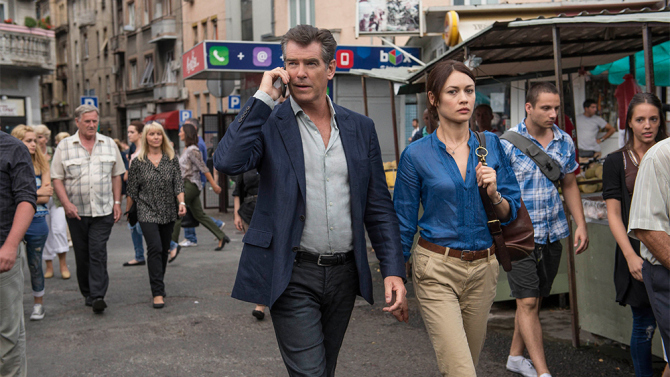
The old saying about knowing the notes but not the song could hardly find a more fitting filmic representation than “The November Man,” which runs through spy movie cliches with such dogged obligation that it often plays like a YouTube compilation of scenes from older, better thrillers, generating little overall tension and only occasionally approaching basic coherence. Starring Pierce Brosnan as a very roughly sketched aging spook, this scatterbrained Roger Donaldson pic will have to count on audiences’ lingering ’90s Bond nostalgia to make much headway in late August release.
The basic plot of “The November Man,” adapted from the seventh book in Bill Granger’s 1980s Peter Devereaux series, doesn’t make a whole lot of sense, but that isn’t necessarily a fatal flaw in a thriller. What does matter is that none of the characters do, either. Brosnan’s protagonist Devereaux, a retired CIA veteran called back in for one last job, flits from Bondian superspy to headless bumbler to noble hero to amoral sociopath with remarkably little consistency, and his web of agency allies and enemies is as tangled as a Korean soap opera, and about as easy for non-speakers to understand.
We first meet Devereaux in 2008, when he and brash young agent David Mason (Luke Bracey), among whom the flimsiest of surrogate father-son relationships is suggested, are attempting to smoke out an assassin in Montenegro. When Mason disobeys Devereaux’s orders, a young bystander is killed, leading to Devereaux’s immediate retirement in Switzerland. Five years later, Devereaux is pulled back into the fold to assist in the exfil of a Russian agent – who also happens to be the love of his life – with incriminating info on a war criminal-turned-political candidate named Federov (Lazar Ristovski). The op quickly goes pear-shaped, and a different CIA team lead by Mason ends up shooting and killing our hero’s old flame. Presumably distraught, Devereaux goes rogue.
So far, so Bourne. But from here, the action makes a permanent switch to Belgrade, where a trail of murdered Chechen refugee girls leads Devereaux, as well as his ex agency allies, a ballerina-like Russian assassin (Amila Terzimehic), and a New York Times reporter (Patrick Kennedy) all to the doorstep of relief agency worker Alice Fournier (Olga Kurylenko) who may have information on a missing refugee who may have some connection to the murdered girls, who in turn may have some connection to Federov.
Why exactly is Devereaux here? Does he want revenge on the agency? To clear his name? To settle his Oedipal issues with Mason? To take down a corrupt Russian leader? To rescue his former handler Handley (Bill Smitrovich), who has been taken hostage by fellow agents for some reason? The film never really decides.
In any case, Devereaux takes Alice – who trusts no one except for the violent, unhinged, gun-toting stranger who shows up screaming “you have to trust me!” – under his wing, and drags her along for a series of stakeouts and shootouts whose endgame is never clear. Oftentimes dialogue seems to have been written on the fly, leading to such awkward transitions as Devereaux assuring Alice that “no one can hide forever,” and then within 30 seconds handing her a stack of Euros and advising her to “go somewhere no one can find you.”
In a cinematic landscape awash in tiresome origin stories, it’s theoretically admirable that “The November Man” introduces its hero in media res. But for those without previous knowledge of the character, Devereaux’s motivations and methods prove thoroughly baffling. He’s largely depicted as a flawless professional, until he inexplicably binge-drinks half a bottle of Scotch in the middle of a delicate operation. He spends most of the film standing up for victimized women, until one bizarrely misjudged scene has him kidnap Mason’s civilian girlfriend (Eliza Taylor), terrorize her to the point of tears with a gun and a knife, and then slash her femoral artery to prove some sort of point. (The most callous of the film’s many loose ends, this incident is never mentioned again, nor do we learn if she survived the attack.)
Though there isn’t much he can do with this character, Brosnan still has one of the best cocky struts in the business, and save for Liam Neeson, there are few sexagenarians who look as natural tossing off tough guy quips with a gun in hand. Kurylenko plays virtually the same character she essayed with Brosnan’s 007 successor Daniel Craig in “Quantum of Solace,” and clearly remembers how to do it. No one else makes much of an impression.
Despite frequent use of slow-motion in the fight scenes — especially when those fight scenes involve Silly String-like projectile spurts of blood — the film lacks a single memorable action setpiece, with nearly every conflict settled through brief shootouts or the application of convenient blunt instruments to unsuspecting heads. “The November Man’s” product placement is as intrusive as any of Brosnan’s old Bond pics, but never anywhere near as creative. (Representative examples include two very long, static shots of a Mercedes hood ornament, as well as a loving closeup on the Samsung battery of a cell phone Devereaux has just defenestrated.)
The film’s Serbian locations, however, are well-scouted and well-shot, with the film’s geographic specificity representing a nice change of pace from the often vague Eastern European settings employed in such films. Marco Beltrami’s score is sufficiently loud.






